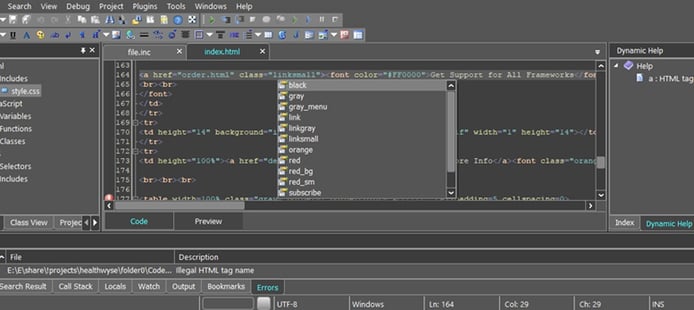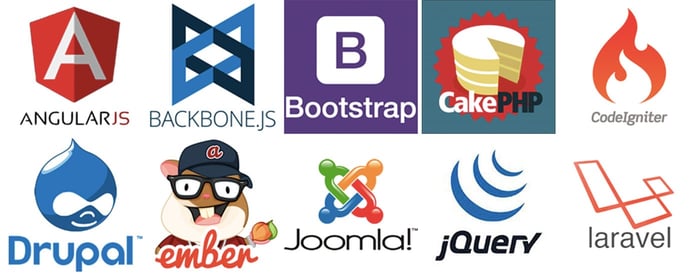
TL; DR: CodeLobster delivers a multiplatform IDE solution to help developers streamline their workflows. Its software tool allows customers to save time and money by combining resources, providing shortcuts, and assisting developers to avoid mistakes. CodeLobster supports all the popular frameworks including: Drupal CMS, Joomla CMS, Magento CMS, Smarty template engine, Twig template engine, JQuery library, AngularJS, BackboneJS, ReactJS, Laravel, MeteorJS, Phalcon, CodeIgniter, CakePHP, Symfony, Yii and WordPress. IT teams can also organize their projects and simplify their team environment with IDE. CodeLobster’s competitive low prices, emphasis on customer satisfaction, and timely software updates keeps the company and its clients postured for success.
Time often seems to move against us, especially when we’re on a deadline. For software developers, time constraints can cause sacrifices in quality and brushes with mediocrity. Can anyone create anything seemingly perfect when you have hundreds of tasks to complete within a scanty timeline?
According to GoodFirms, 61.6% of ordinary software projects can take up to four to five months to complete, while 38.5% fall into a two to four months timeline, and the completion cycle for 15.4% of projects go more than six months. Delivering a top-notch program takes a lot of effort, and working under a strict schedule can make it even more difficult. Most software development teams rank this pain point as one of their top five challenges in producing an efficient application.
The CodeLobster team has had first-hand experience with the pressures of a time crunch. Before the company became what it is today, the team would develop websites for clients using Drupal and WordPress CMS. It soon realized that it needed a solution to optimize its own development process.

The CodeLobster team searched for an integrated development environment, or IDE, to speed up the process and improve organization. But there was a limited supply of IDEs on the market — none with adequate support for its desired framework and the autocomplete feature. So the company shifted its focus to offer a more robust IDE solution to the market.
“We had several C++ developers who proposed to develop this functionality quickly. It was our beginning. And after that, we were developing our IDE, adding new features, etc.,” said the CodeLobster spokesperson.
CodeLobster IDE solutions help developers simplify their coding process. It decreases the pressure and organizational challenges surrounding software projects by placing everything in one platform and eliminating miscellaneous, time-consuming tasks.
Instead of integrating, deploying, and monitoring standard development tools individually, developers can do it all with the integrated development environment. Customers can use CodeLobster IDE when building with PHP, HTML, CSS, and JavaScript.
CodeLobster also supports all the popular frameworks including: Drupal CMS, Joomla CMS, Magento CMS, Smarty template engine, Twig template engine, JQuery library, AngularJS, BackboneJS, ReactJS, Laravel, MeteorJS, Phalcon, CodeIgniter, CakePHP, Symfony, Yii and WordPress.
CodeLobster Offers Cross-Platform IDE with Various Plug-ins
When CodeLobster began its operations, its mission was to respond to a need in the market. It recognized the demand for a suitable tool to help web developers streamline their programming process and took after it.
Software development can be a complex landscape to conquer. CodeLobster IDE helps customers increase their productivity levels and efficiency. Its features, including syntax highlighting and autocomplete, help programmers avoid mistakes and save time while writing codes. The IDE also manages the resources developers use during application creation.
The CodeLobster solution combines the activities of writing a program into a single platform, which facilitates the process of editing source code, building executables, debugging, and so on. It also runs on the coding language of choice and provides a text editor that developers can compile and build.
And CodeLobster has continued to improve the well-rounded tool after its initial launch. The IDE provider upgraded its solution to make it more accessible to developers using various platforms.

“After a couple of years, we took the next huge step. Many developers used and are using Macs or Ubuntu. And we rewrote our IDE on a multiplatform engine,” said the CodeLobster spokesperson.
CodeLobster’s cross-platform engine allows customers to use different server types and open-source software and access its IDE. This factor also benefits teams and helps them work more seamlessly.
Customers can validate code locally with CodeLobster’s internal PHP debugger, which detects current server settings and organizes corresponding files in order. They can also access support by using the tool’s special Help control.
The CodeLobster spokesperson said the main advantage of its IDE solution is the variety of plug-ins the company offers to accommodate popular frameworks. CodeLobster provides Drupal CMS, Joomla CMS, Magento CMS, and Smarty Template Engine plug-ins, to name a few. These plug-ins give customers more flexibility and support for their development by adding specific features to their existing programs.
Competitive Low Prices and Customer Feedback Implementation
Prices for CodeLobster products aren’t as expensive as the crustacean referred to in the company’s name. The company delivers top-notch IDE solutions for a fraction of the price of those of its competitors without sacrificing quality.
Most IDEs run for $100 to $500, but CodeLobster prices its professional version for $59.95. If developers need future updates, they only need to pay $19.95 per year.
CodeLobster also offers a free version of its software. The difference is that its professional IDE is more advanced and has additional features. Those additions consist of various plug-ins, code formatting and snippets, and a SQL manager, among other features.
The professional version is also a shareware product. Customers can purchase and sign up on the CodeLobster site. Then CodeLobster will send a registration key after payment.

The free version works best for customers looking for a simple solution and comes with the fundamentals, including the different coding languages editors, inspector, and debugger.
The CodeLobster team also listens to customer feedback to improve its IDE tool. After all, finding solutions to pain points in the market is why the founder created the company. And CodeLobster has onboarded several features since its inception.
“We added many features by request of our customers: FTP/SFTP, Markdown support, Git integration, PHP debugger, JS debugger, File Explorer, SQL manager, and so on,” said the CodeLobster spokesperson.
CodeLobster made its system more robust by implementing these requests while boosting customer satisfaction and prompting smoother web development.
Maintaining Programming Updates with Timely New Releases
Nothing’s worse than purchasing a tool that doesn’t work after a few months of use. Fortunately, CodeLobster keeps a vigilant eye on its software and the hiccups that may arise with its scheduled programming maintenance.
The IDE provider continues to update its software and features to accommodate new changes in the market and fix bugs. Whether it’s adding a new plug-in or support, CodeLobster ensures its releases are on time and that they improve customer experience.
“We release new versions each couple of months. Now we are working on special support for the Python language. The new version will be released very soon,” said the CodeLobster spokesperson.
CodeLobster continuously monitors its tool and customer feedback to optimize the efficiency and output of the IDE. The company also plans to expand its accessibility for other frameworks and include more support tools to help customers with IDE mechanics soon.
“After that, we will develop a special plug-in for the Django framework. And we are going to add support for Ruby on Rails, including autocomplete, context help, dynamic help, tooltips, and so on,” said the CodeLobster spokesperson.
HostingAdvice.com is a free online resource that offers valuable content and comparison services to users. To keep this resource 100% free, we receive compensation from many of the offers listed on the site. Along with key review factors, this compensation may impact how and where products appear across the site (including, for example, the order in which they appear). HostingAdvice.com does not include the entire universe of available offers. Editorial opinions expressed on the site are strictly our own and are not provided, endorsed, or approved by advertisers.
Our site is committed to publishing independent, accurate content guided by strict editorial guidelines. Before articles and reviews are published on our site, they undergo a thorough review process performed by a team of independent editors and subject-matter experts to ensure the content’s accuracy, timeliness, and impartiality. Our editorial team is separate and independent of our site’s advertisers, and the opinions they express on our site are their own. To read more about our team members and their editorial backgrounds, please visit our site’s About page.



